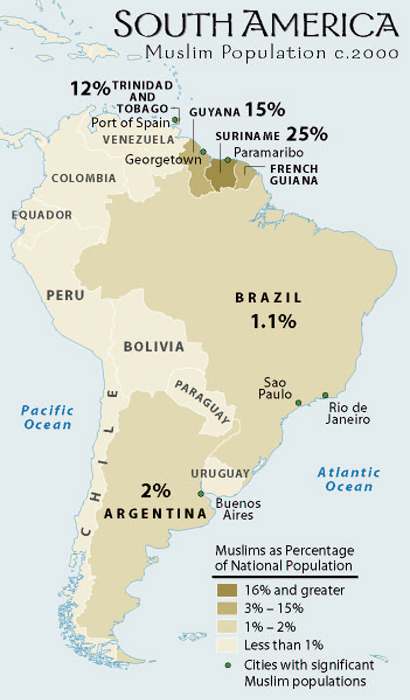
(Original Source)
NOTE: This map comes from a Muslim source, but the numbers are exaggerated.
Believed to come in under fair use
In the Guyanas, and the Caribbean islands of Trinidad and Tobago, a lot of indentured Muslim workers did come in from India, Indonesia, and Asia. These Muslims can form a noticeable percentage of the local population; but these countries tend to have small populations.
While Arabs are among them, the Arabs are not the base of the Muslim populations.
The odd fact is that the Arabs among them tend to be Christian, as this page from a Trinidadian goverment website proclaims.
Syrian/Lebanese Presence in Trinidad and Tobago
RELIGION
The last group of immigrants to venture to colonial Trinidad originated in the region previously known as Greater Syria, which comprises of present day Iraq, Syria, Palestine and Lebanon. Many of the Lebanese hailed from the villages of Buhandoun and Amyoun while the Syrians came from villages in the ‘Valley of the Christians.’ These Arabs emigrated to the Caribbean from as early as 1904 in an attempt to escape religious persecution and economic hardship in their native countries.
…
Arabs are very religious and quickly assimilated into the Roman Catholic Community. Although the Syrian-Lebanese were either Maronite, Antiochian Orthodox or Orthodox, they preferred to join the Catholic faith because, according to Rose Abraham, “[the Catholic Church] is the highest, the strongest church…the only church Arabs felt is a good church.” It can also be inferred that the similarity in rituals and teachings between the Orthodox and Roman Catholic Churches would have been comforting to the Syrian-Lebanese immigrants.
NOTE: The emphasis is mine.
Note that the Arab Christians came to Trinidad & Tobago to escape persecution from Muslims.
The year of the census is in parenthesis.
| Country | Total Pop. | % Muslim | % Christian | % Hindu | Total Muslim | Source |
| Suriname | ~587,000 (2016) | 13.9% (2012) | 48.4% (2012) | 22.3% (2012) | ~81,000 | Wikipedia |
| Guyana | ~736,000 (2016) | 6.8% (2012) | 63.9% (2012) | 24.8% (2012) | ~50,000 | Wikipedia |
| French Guiana | ~250,000 (2013) | Unknown | Vast Majority | Unknown | small | Wikipedia |
| Trinidad&Tobago | ~1,350,000 (2015) | 5.0% (2011) | 55.3% (2011) | 18.1% (2011) | ~68,000 | Wikipedia |
French Guiana is technically part of Metropolitan France; but has a population of barely 1/4 Million.
Together these four countries/areas are 2-3/4 Million, which would not equal one medium sized Latin American city. The Muslim concentrations in them are not majorities, nor are they significant for the whole continent even though they might carry local clout. But in both Suriname and Guyana, Muslims never rise to even one quarter of the population, despite what the map claims.
Again, we see the tendency of Muslims to exaggerate their numbers, as they do in the above map.
So the larger percentage of Muslims in the Guyanas, and Trindad and Tobago, is statistically inconsequential for Latin America as a whole. Moreover, these countries tend to be outside the Latin American world of Spanish and Portuguese – speaking English, Dutch, or French.
Moving back to Latin America proper: The 2% given for Argentina, and the 1% given for Brazil is probably exaggerated. Muslim authorities tend to exaggerate their numbers.
While Argentina might be roughly 1.5% Muslim, in reality almost all were non-practicing until very recently.
May 9, 2017 – Edited: Updated figures. Had to update a link.
